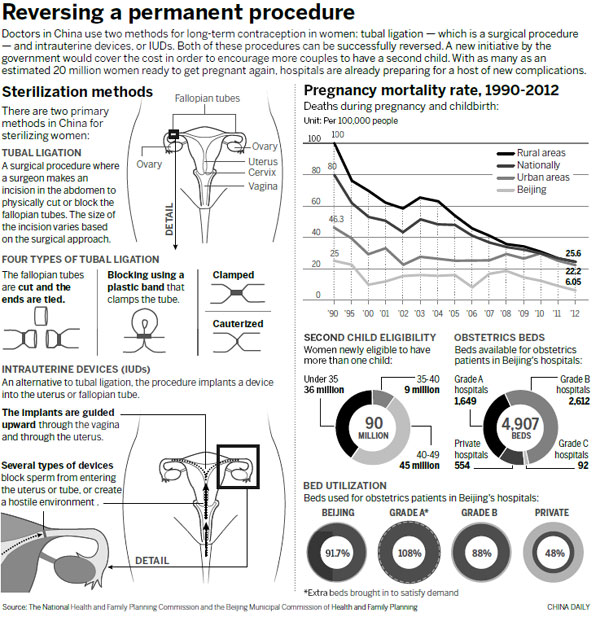Hospitals beef up services to handle spike; grassroots clinics seen as pressure reliever
Hospitals and health authorities across China are bracing for an expected surge in older pregnant women this year, after the country adopted a second-child policy.
The policy, which encourages all couples to have two children, took effect on Jan 1.
An additional 90 million women in China, roughly equivalent to the total population of Germany, will eligible to have a second child under the policy, according to estimates by the National Health and Family Planning Commission, China's top health authority.
The commission said 60 percent of the 90 million will be 35 years old or older, which will result in increased risk of complications in pregnancy and pose more challenges to health authorities in ensuring maternal and child health.
Measures will be taken to guide pregnant women to choose grassroots hospitals first, since top-level hospitals are overcrowded, the commission said.
The health authorities are planning to improve the hospitals' emergency treatment capabilities and streamline procedures so that deliveries with critical complications can be transferred between hospitals in a timely manner, the commission said.
"We expect a sharp increase in the number of patients this year," said Chao Wei, a publicity officer with Beijing Obstetrics and Gynecology Hospital, one of the capital's best for childbirth.
Chao said the hospital opened night clinics in early January, which are open from 5 pm to 8 pm on weekdays, to cater to the increasing number of patients.
The hospital will employ more obstetricians, pediatricians and midwives this year, he said, adding that it has also expanded its emergency ward, increased emergency beds from eight to 18 and increased intensive-care beds for newborn babies from 30 to 60.
Liu Wenjing, a marketing manager at the Beijing United Family Hospital, said the hospital has seen an increasing number of pregnant patients since November and has extended the clinic hours.
The hospital increased beds, B-ultrasound services and examination rooms to cope with increasing number of patients, she said.
Not just Beijing but many other places in China, such as Shijiazhuang, Hebei province, and Guangzhou, Guangdong province, are also seeing measures taken by hospitals for the expected birth peak, according to media reports.
2021 peak
According to the Beijing Municipal Commission of Health and Family Planning, the number of women in Beijing eligible to have a second baby has increased by 2.36 million after the policy was adopted in January, and most of the women who want to have a second child will have finished before 2021. So the birth peak will extend for about five years, it said.
The total number of obstetrics beds in Beijing's hospitals last year was nearly 5,000, but utilization rates differ greatly among different types of hospitals, according to Wu Ya, an official for maternal and child healthcare at the Beijing Municipal Commission of Health and Family Planning.
In some large comprehensive hospitals, utilization rates in obstetrics have reached 108 percent, meaning that all regular beds in the obstetrics departments at these hospitals are occupied every day, with extra beds added to cope with demand. But in some smaller hospitals, such as community hospitals, the utilization rate is only 14 percent.
"We are worried that patients will swarm to big hospitals, which are already overcrowded," she said. "We hope more patients will go to smaller hospitals, so the big hospitals will have more room for those at higher risk."
The commission is considering a measure to guide pregnant women to seek treatment at smaller hospitals first. But those who are directed to a smaller hospital should not worry, because the transfer mechanism from small hospitals to bigger ones will be smooth as long as the doctor believes it necessary, she said.
To meet the expected rise in the number of pregnant women at higher risks, hospitals will also improve priority services for that group.
"We will designate hospitals to specially receive and treat newborn babies with critical diseases" to improve chances of survival, she said.
In 2014, the mortality rate of pregnant women was less than 22 per 100,000, compared with 30 per 100,000 in 2010, while the mortality rate of babies declined to less than 9-in-1,000 in 2014. The rates have reached the average level of high-and medium-income countries, according to Yang Wenzhuang, an official with the National Health and Family Planning Commission.
Liu Xiaoli contributed to this story.
wangxiaodong@chinadaily.com.cn
|
Six-year-old Xu Yuechen looks at her baby brother by the bed of her mother at a maternity hospital in Fuyang, Anhui province. Wang Biao / for China Daily |

(China Daily 01/25/2016 page5)
